Dark Sky: Preserving 'sparkling delights' of North East's skies
- Published
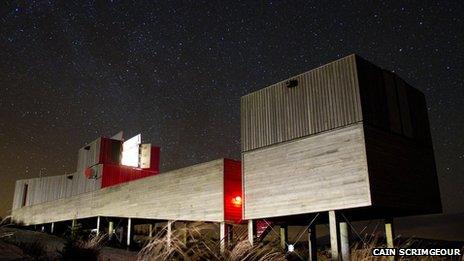
Photographer Cain Scrimgeour, from North Tyneside, took photographs of the sky at night in Northumberland which were used in the bid.
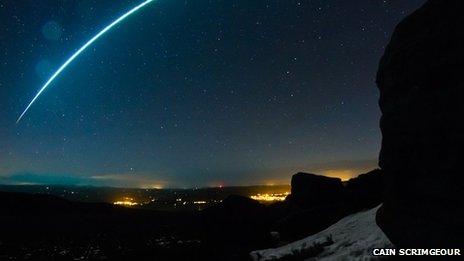
The park has been given special protection, like Exmoor and the Brecon Beacons, so that stargazers can continue to observe the skies without the threat of light pollution
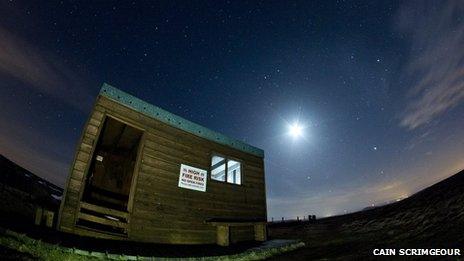
The International Dark Sky Association granted the status on Monday 5 December
"I was about six years old and I found the moon, it took me about an hour, and I was fascinated. Since then, I've just had that childhood curiosity for space and planets, that sense of wonder, it's just phenomenal," says Gary Fildes.
A childhood passion that, more than 30 years later, has sparked the idea of protecting Northumberland's night skies.
The director of the Kielder Observatory was part of a joint application by Northumberland National Park Authority, Kielder Water and Forest Development Trust and the Kielder Observatory Astronomical Society to gain dark-sky status for the north-east of England's window to the universe.
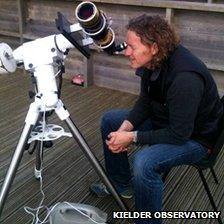
Gary Fildes has been fascinated by the night sky since childhood
"For the North East to have this, and to have the dark sky protected and have people who want to protect it, it's just absolutely wonderful," Mr Fildes continues.
"It gives us a new dimension to the people of the North East - our warmth and our hospitality is now even stretching out to the universe."
'It's real'
About 50,000 people have shared Mr Fildes' enthusiasm for discovering more about "our cosmic home".
"A highlight for me is realising how 'into' astronomy people are and how much they love exploring the universe. The real thing that's been driven home for me is the surprise on people's face when you explain certain concepts to them and how it just makes sense," he said.
"We had an 80-year-old lady at the observatory once and she started crying when she saw Saturn because she never ever believed she would be able to see it like that and her words were 'oh my god, it's real!'
"She'll have been through World War Two and went through some incredible things in her life, and for the first time in her 80 years she saw the planet Saturn for the first time, and saw it for herself, and that one moment alone was worth building the observatory for.
"We have big plans to develop the Kielder Observatory further and cement its place as the UK's most successful facility of its kind. Dark-sky park status will be a big help in this drive.
"Hopefully the award is going to protect that for generations to come."
The International Dark Sky Association, a US-based organisation which awards the status, made the decision without stepping foot in Northumberland.
It based the decision on an application packed with light readings, information on light audits and light pollution and the written enthusiasm of North East astronomers.
The area is noted as one of the best areas in the UK to see the stars, external, although the Northumberland National Park Authority said it still suffered some light pollution from the neighbouring Tyne and Wear region.
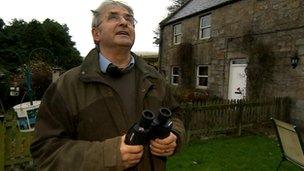
John Wilson has seen a growing interest in "star gazing breaks"
Duncan Wise, from the authority, said: "The International Dark Sky Association launched a global campaign to try and get certain areas designated as dark sky parks or dark sky reserves to indicate there are still places on the planet where you can enjoy the beauty of the night sky without any light pollution.
"The dark skies of Northumberland are some of the best you'll ever see anywhere in Britain and we needed to find a way of ensuring that we could conserve and protect them.
"It's also about celebration - it's not just about conservation of the dark sky, it's about demonstrating you've got a program of events and activities that will encourage people to access the dark sky park."
'Sparkling delights'
John Wilson, a farmer and owner of Whitelee Holiday Cottages, near Byrness Village in Northumberland, has seen a growing interest in "star gazing breaks" and so-called astro-tourism with people coming from the south of England and further afield to the North East.
He welcomes them with a pair of binoculars and a planisphere chart to help would-be astronomers with their night-time discoveries.
He said: "They come for the environment. I think there's going to be a growing interest, and as conurbations spread out and skies become more polluted, I think people are going to be coming here more often so they can enjoy those sparkling delights.
"Here, you can see the milky way unaided, without binoculars, it is so clear.
"We came out one night at midnight and we saw a whole family laid on a sheet just gazing up at the stars. It's great to bring joy to families that can't experience it at home."
TV impersonator Jon Culshaw, who is an amateur astronomer and filmed an episode of the BBC's The Sky at Night in the park said: "The site of Kielder Observatory is a truly magnificent dark-sky area.
"It was incredible to witness light levels fall to such a depth that you would swear the stars were casting shadows. It's a sad thought that such genuinely dark sky sites are becoming increasingly rarer."
- Published8 May 2013
- Published5 March 2013
- Published19 February 2013
- Published7 January 2013